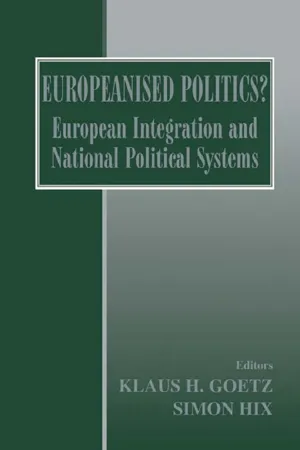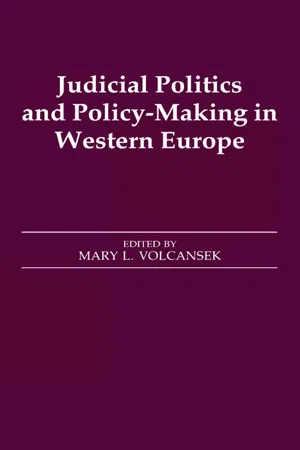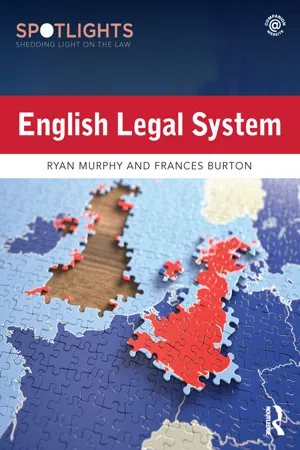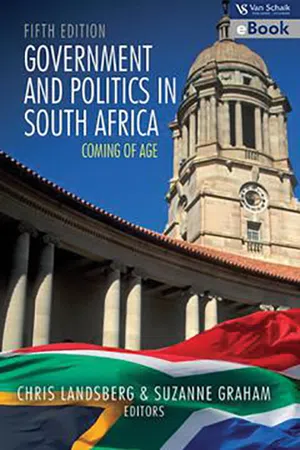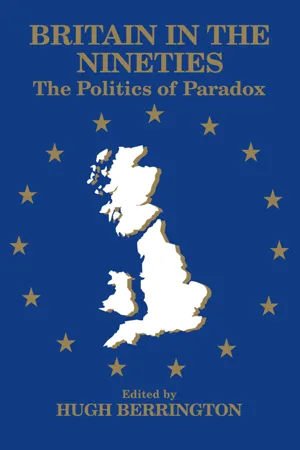Politics & International Relations
UK Judicial System
The UK judicial system is a hierarchical structure consisting of different courts, with the Supreme Court at the apex. It is independent of the legislative and executive branches and is responsible for interpreting and applying the law. The system includes both criminal and civil courts, and decisions made by higher courts set precedents for lower courts to follow.
Written by Perlego with AI-assistance
Related key terms
7 Key excerpts on "UK Judicial System"
- eBook - ePub
- Hilaire Barnett(Author)
- 2019(Publication Date)
- Routledge(Publisher)
In this chapter the role of the judges, the differing categories of law and the court structure are discussed, together with an introduction to the doctrine of precedent and statutory interpretation. Of central constitutional importance is the independence of the judiciary: independence from the government and freedom from any external influences which could compromise that independence. In Chapter 4 the separation of powers was discussed: in this chapter we look further at the laws and conventions which uphold judicial independence and consider the question of judicial accountability. There is no single unified legal system within the United Kingdom. England and Wales share one system, while Scotland and Northern Ireland each has its own distinctive system. Following devolution (see Chapter 11), Scotland, Northern Ireland and Wales also have their own law-making Parliament or Assembly with its powers defined in an Act of the United Kingdom (UK) Parliament. Paradoxically, England is the only country in the United Kingdom which does not have its own law-making body. By convention, the UK Parliament will not legislate on matters which have been devolved to a national Assembly or Parliament. However, in relation to non-devolved matters, the UK Parliament continues to legislate for the whole of the United Kingdom. Supplementing statute law is the common law – the law derived from judicially decided cases. In addition, during the UK’s membership of the EU, the law of the European Union (EU) entered into domestic law under the European Communities Act 1972 and the Human Rights Act 1998 enables rights protected under the European Convention on Human Rights to be enforced in the domestic courts. As a result, the law is a mixture of statute law made by the UK Parliament and the devolved legislatures, the common law and European law. The Ministry of Justice paper Transforming Our Justice System 2016 sets out its vision for the future of the court and tribunal system - eBook - ePub
Europeanised Politics?
European Integration and National Political Systems
- Klaus H. Goetz, Simon Hix(Authors)
- 2012(Publication Date)
- Routledge(Publisher)
The Positioning of EU Judicial Politics within the United Kingdom
Damian Chalmers DOI: 10.4324/9780203045534-8Any lawyer can, at best, be ambivalent about the study of judicial politics. The treatment of courts ‘as one governmental agency among many–as part of the … political process rather than as a unique body of impervious legal technicians above and beyond the political struggle’1 suggests a supreme disinterest in the epistemic foundations of law. This heavy instrumentalisation, by reducing courts to simple agents of the political process, can offer little instruction in the grammar codes of legal knowledge, processes and discourse. Yet it is the internalisation of these by participants that forecloses certain options and provides a certain resistance to, and therefore autonomy from, outside pressures–in essence, those very legal qualities that lead political or other actors to resort to law. For this author, at least, ambivalence is not synonymous with dismissal. The autonomy of the political system imposes external constraints upon the operation of the law and, whilst the judicial system may be autonomous, it is not autarkic. It will often be used instrumentally by political actors. Indeed, a feature of the legal system is that it is particularly vulnerable to these outside pressures. For its quest for formal and functional effectiveness leads not just to a concern with the problem of compliance, but also to a desire to ‘perfect’, and therefore be sensitive to, the properties of the political processes, domestic and European Union (EU), that it regulates. The insights offered by judicial politics lie precisely on this apex in its strong focus upon the process of negotiation and adjustment between the judiciary, other agencies of government and the wider political sphere.Judicial politics studies have a particular strong resonance in the case of the judicial system of the EU. The dependence of the European Communities' (EC) legal system upon a variety of national governmental agencies for its implementation, enforcement and much of its application has led to concerns about its formal effectiveness; at the same time, its relatively inchoate and ‘young’ nature has rendered it particularly vulnerable to charges of being excessively disruptive. These structural features have been exacerbated by the activities of the European Court of Justice (ECJ). It has both developed relationships with national courts and litigants that, in functional terms, have acted as surrogate policy processes at the expense of national governments,2 and, through its constitutionalist case law, placed itself at the centre of all debates about the civil and political identity of the Union. These have raised expectations about the capability of EC law to exert compliance and about the demands in terms of liberal values that can be exerted by it,3 - Mary L. Volcansek(Author)
- 2014(Publication Date)
- Routledge(Publisher)
Second, we should note that various events and developments in the last decade or so, and the prospect of additional ones in the future, have raised, and look set to raise further, the political profile of the courts. Some of these, such as the growth of judicial review of administrative action, will be discussed in the text of this essay. Others, such as the scandals over recent miscarriages of justice in the criminal courts, the growing importance of European law and culture on the UK, and the continuing debate about whether the UK should incorporate the European Convention on Human Rights into its domestic law, will be touched on more briefly.The total omission of many other important issues and examples – such as the political furore that accompanied the Heath government’s unsuccessful attempt to use a National Industrial Relations Court to solve industrial disputes in the early 1970s; and more recent political controversies about some male judges’ leniency in sentencing rapists (aggravated in some cases by grossly offensive remarks about, for instance, the alleged ‘contributory negligence’ of the victims) – is explained purely by shortage of the space that would be necessary to tackle comprehensively all ramifications of this important subject.CONSTITUTIONAL AND INSTITUTIONAL CONTEXT
We must start with some constitutional platitudes. On the face of it, this seems like a somewhat tedious exercise, but it is an important one in so far as a lot of the discourse about judicial politics and policy-making in Britain still stresses their significance. There is a tendency in Britain (and probably elsewhere, given the inherently inertial quality of constitutions) for those involved in government to take refuge in antique but comfortingly familiar constitutional slogans that turn out on close inspection to be wildly at variance with current reality. Constitutional rules have to do with defining territorial and functional boundaries, and acknowledgment that they have broken down raises troubling demarcation issues, often threatening both to system equilibrium and to entrenched professional vested interests. Hence, potentially troublesome constitutional issues tend not be addressed, other than by academics, who have nothing to lose. There are often large gaps, in this and other contexts, between the rhetoric and the reality of constitutional practice.- eBook - ePub
- Ryan Murphy, Frances Burton(Authors)
- 2020(Publication Date)
- Routledge(Publisher)
Chapter 7 The judiciaryIntroduction
The judiciary is at the heart of the English Legal System, interpreting and applying the law that Parliament makes to individual cases. Additionally, judges make law in certain areas. As judges are responsible for recognising and giving life to ‘the law’, particularly through the common law, it is vitally important that they retain their authority and the trust of citizens. Maintaining independence and public trust is not always easy but knowing the nature of the judicial task and the challenges that the structure of the judiciary poses will give a richer understanding of how law operates in the English Legal System on a day to day basis.This chapter has two main aims. First to introduce the reader to the role of the judiciary and to explain (briefly) the different types of judicial office. Second, the chapter will explore some of the thornier issues (such as diversity in appointment and misconduct in judicial office) which jeopardise or threaten the attainment of one or more of the objectives of the legal system.As you read
This chapter consists of a fairly dense set of (sometimes descriptive) information about various aspects of the judiciary. As you read, be sure to try to contextualise this information in light of the other chapters of the textbook and avoid reading it in isolation. - eBook - ePub
British Civilization
An Introduction
- John Oakland(Author)
- 2019(Publication Date)
- Routledge(Publisher)
7The legal system- Legal history
- Sources of British law
- Court structures in England and Wales
- Civil and criminal procedure in England and Wales
- Law and order
- The legal profession
- Attitudes to the legal system and crime
- Exercises
- Further reading
- Websites
Legal structures have played a central part in British civilization for many centuries. Initially, leaders or monarchs, and then Parliament created the law; lawyers and the courts have serviced it; and all citizens are subject to it. It has been influenced by social conflict, political struggle and constitutional change. This chapter examines its history, the main elements that comprise it today, and the problems that it faces.Law and order, and the actions of the legal system are of concern to the British people and affect individuals at different levels in their daily lives. Legal issues regularly appear in opinion polls about the state of the country, and include the need for accurate figures of crime offences, anti-social behaviour, violence on the streets, yobbishness, security and terrorism issues, cybercrime and the monitoring of communications systems, and cuts in police forces. Opinions differ on whether the legal system has been able to deal effectively with these concerns.Britain does not have a common legal system. Instead, there are three separate elements: those of England and Wales, Scotland, and Northern Ireland. These sometimes differ from each other in their laws, procedures and court names. Following devolution, some laws are applicable only to individual devolved nations, although UK Parliament legislation on reserved matters still applies to all of Britain.To simplify matters, this chapter concentrates on the largest element: that of England and Wales, with comparative references to Scotland and Northern Ireland. The Northern Irish legal system is similar to that of England and Wales. But Scotland has historically had its own independent legal apparatus. - eBook - ePub
- Landsberg C, S Graham(Authors)
- 2017(Publication Date)
- Van Schaik Publishers(Publisher)
694The legal system and the judiciary
Roxan Venter1The following key issues are dealt with in this chapter:- The nature of law and of the judicial function
- The origins and nature of the South African legal system
- How law is classified and the sources and contents of South African law
- The South African court system
- The independence of the courts
- The judicial process and procedures that are followed in civil and criminal cases
- The role and influence of the judiciary in the political system
4.1 Introduction
Every state has a legal system comprising the rules of law that apply in that state. Everybody, from the different organs of state to the individual, is engaged daily in the application of those rules of law to their relationships. Every state also has a judicial branch of government that resolves, on an authoritative basis, disputes that arise between members of society, by the application of the appropriate rules of law. Within the trias politica, the judiciary, as the third branch of government, therefore has the key function of ensuring that everybody – the people as well as all organs of state – abides by the law.4.2 The nature of the law
The notion of an independent judiciary that applies the law impartially and without fear, favour or prejudice is generally accepted as a cornerstone of democracy. But what is law, and what is the nature of the judicial function? It has been said that law consists of rules that dictate how we must or must not act as members of society (Rautenbach & Malherbe, 2009: 2). As there are many other rules that govern our conduct, such as the rules laid down by parents for their children, associations for their members, and universities for their students, the question to be answered is: when can rules be described as law?There is one determining factor, which distinguishes rules of law from other rules that apply in society: only rules of law can be enforced by the State (Rautenbach & Malherbe, 2009: 4). There are different reasons for this. Firstly, 70 - eBook - ePub
Britain in the Nineties
The Politics of Paradox
- Hugh Berrington(Author)
- 2014(Publication Date)
- Routledge(Publisher)
The Judicial Dimension in British Politics NEVIL JOHNSONDuring the past 20 years or more the decisions of judges and of other officeholders and institutions with adjudicatory functions have begun to impinge more often and more insistently on the spheres of political and administrative discretion in Britain than was usual in the past. Moreover, determinations of the courts, and especially in the sphere of public law, receive a degree of public attention virtually unknown a generation ago. It is not uncommon for two or three decisions affecting the powers and financial liabilities of the government or other public authorities to come out within a single week and to be commented upon in approving terms in the media. All this stands in sharp contrast to the traditional understanding of the role of the courts. When the independence of the judicial power was conclusively established in England by the ‘Glorious Revolution’ of 1688–89, one of the implicit conditions of this outcome was that the judges should take care not to encroach on the legitimate spheres of discretion of the sovereign political authorities, Crown and Parliament. Judges were expected to interpret the law – both the judge-made common law and parliamentary statutes – in accordance with precedents and reason. It was not their job to shape public policy, even though occasionally by their decisions they did establish great points of principle central to the rule of law, as for example in Entick v. Carrington in 1765.1 But for the most part the judges of the common law did not insert themselves into the spheres reserved for the discretion of the Crown and its ministers or of Parliament as the sole source of new statute law.During the present century both of the main tendencies in British party political life have generally endorsed this habit of judicial reserve. The Right has been content for judges to stick to a literal interpretation of statutes and uphold the strong bias in favour of the rights of private property inherent in the common law.2 Such an approach also meant that the prerogatives of both Parliament and ministers of the Crown remained as a rule beyond serious challenge in the courts. All this was broadly in harmony with the Conservative preference for strong, though limited, government. But the Left, too, has usually preferred to keep judges and legal processes out of the traditional spheres of politics and government, though for somewhat different reasons from those which carried weight with Conservatives. For the Left, and especially for the Labour Party after it succeeded the Liberals as the principal party of reform, the judicial power was an object of suspicion on several grounds and should be kept at bay. It was plainly ‘undemocratic’ and on that account alone should not impose its values on decisions reached by democratically accountable politicians; it was persistently prejudiced in favour of private-property rights and could, therefore, be expected to oppose collectivising measures involving wealth redistribution and greater equality; and more generally, since judges and many lawyers came from privileged levels of society, they could not (like politicians) understand the aspirations of ‘ordinary people’. So the traditional view from the Left was that the less judicial interference there was with the interpretation of statutes, the better it would be for the cause of social reform.3
Learn about this page
Index pages curate the most relevant extracts from our library of academic textbooks. They’ve been created using an in-house natural language model (NLM), each adding context and meaning to key research topics.

